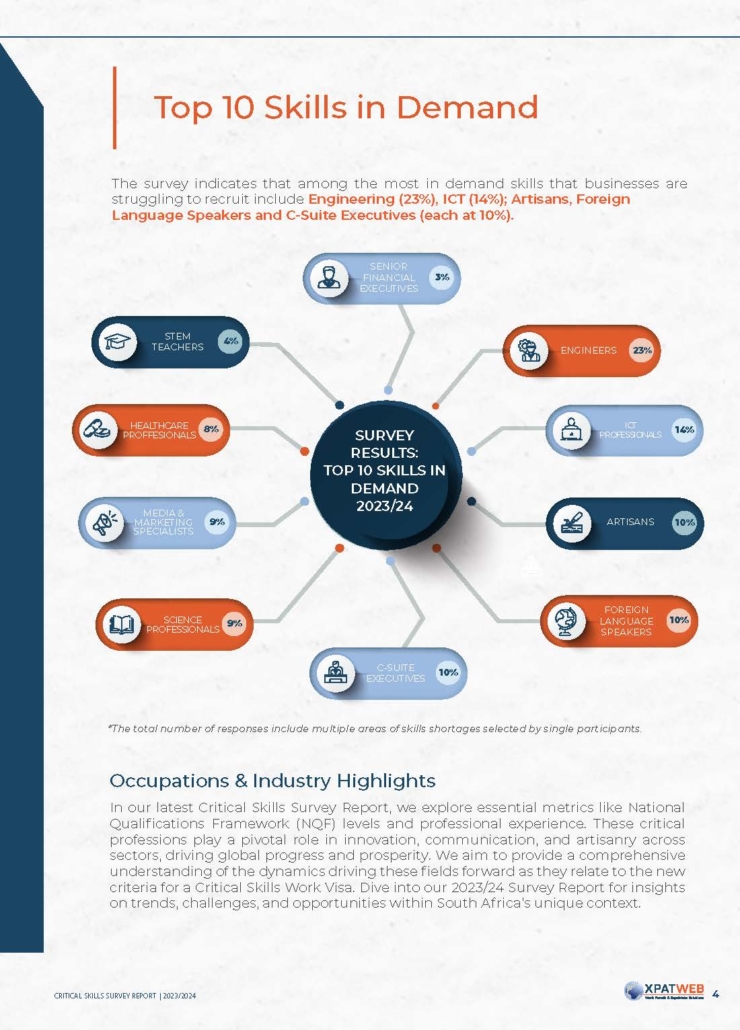Engineers, ICT professionals top the list of skills businesses struggle to recruit
/in 2024, News, Visa Category /by xp-adminWhen it comes to ICT professionals, 14% of respondents struggle to find the experienced talent they are looking for. The top five most sought-after skills in this sector are software developers, data analysts, data scientists, specialist information technology managers and IT engineers.
Also making the list of top 10 skills in demand, are science professionals, media and marketing specialists, healthcare professionals and STEM teachers (science, technology, engineering or mathematics).
This is the fifth edition of the Survey. It is widely used in the market to inform HR strategy, as well as by Business Unity South Africa (BUSA) and the National Economic Development and Labour Council (NEDLAC) in policy decisions.
Jacobs, who also serves on the NEDLAC committee representing business, explains, in collaboration with the Department of Higher Education and Training (DHET) and the Department of Home Affairs (DHA), the Survey contributes to shaping the national Critical Skills List.
The DHA’s Critical Skills List informs the issuing of Critical Skills Work Visas for foreign nationals who have the requisite scarce skills to address South Africa’s demand for skilled professionals in key sectors. Because skills shortages negatively affect economic growth and competitiveness, the government implemented an immigration policy to attract talent globally.
“The critical professions play a pivotal role in innovation, communication and artisanry across sectors, driving global progress and prosperity. We aim to provide a comprehensive understanding of the dynamics driving these fields forward as they relate to the new criteria for a Critical Skills Work Visa,” Xpatweb states in the Survey Report.
The success of the national Critical Skills List in attracting required skills from abroad, has been highlighted by Operation Vulindlela, a joint initiative of the Presidency and National Treasury, aiming to accelerate economic reforms.
Dr Leon Schreiber, Minister of Home Affairs, recently emphasized the importance of attracting more skilled professionals to South Africa to boost economic growth. He said for every 1% increase in skilled, legal immigration, there is a 1.25% increase in employment for South Africans.
During a business lunch hosted by Xpatweb in August 2024, Schreiber outlined his vision for transforming the DHA as an engine for economic growth through modernisation, digital transformation, efficient service delivery and efficiency.
The Minister reiterated that attracting employees with the necessary skills to South Africa, is one of the quickest ways to boost economic growth.
To help achieve this, he declared it a priority to eradicate the crippling visa backlog within his department. As proof that this was not just paying lip service to the challenge, the DHA, in collaboration with the private sector, appointed a dedicated team who started working in earnest to have the backlog cleared by December 2024.
The Minister’s visit followed Xpatweb’s Global Mobility Conference a few weeks earlier where several issues shaping the immigration landscape were discussed.
Speaking at this conference, Dr Markus Thill, President: Africa Regions at the multinational group Robert Bosch (Bosch), said in all its legal entities around the world, the company has 1% to 2% expats employed.
The group, a global player in among others the automotive industry, has an annual global turnover of €100 billion and R6 billion in South Africa.
Bosch is constantly challenged to optimize its business and therefore needs top expertise. Although expats are far more expensive than employing an individual from the home country, it is about the know-how and the exchange of that know-how where Bosch has its plants.
Bosch also employs expats who are fluent in or understand French, Arabic, English and German. “It is difficult to find this expertise locally and we mostly have to bring someone in from overseas.”
Thill mentioned the need for professionals who can manage warehouses, as well as workers on the shop floor who are able to program machines.
According to the 2023/24 Critical Skills Survey Report 65% of employers struggle to find artisans with at least 3 to 5 years’ experience. This is higher than in 2021. Some of the most sought-after skills among artisans include electricians, instrumentation specialist artisans and millwrights.









